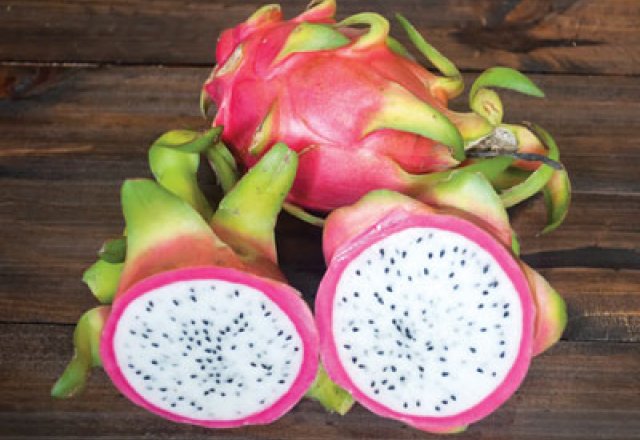
The nutritional benefits of dragon fruit

You'd be surprised at how many nutrients lie in the humble dragon fruit.
Dragon fruit is making its way onto our must-try summer fruit list for its impressive nutritional profile and subtle fresh flavour. Sally O'Neil tells us why she’ll be keeping a few in the fruit bowl – and it’s not just because they look amazing.
Dragon fruit, also known as pitaya or pitahaya, is unique in both its appearance and its nutrition. The fruit has an intense colour (usually bright pink and green, although some species present with a deep red or yellow appearance) and shape not unlike custard apple – but much prettier. The centre of the fruit is made up of a red or white pulp, which can be either sweet or sour depending on the species. Despite its tropical aesthetic, the flesh has a mild taste with a melon-like texture and crunchy seeds like the kiwifruit.
Native to Mexico and Central America, dragon fruit is best grown in tropical climes and is now cultivated across Asia and in Australia (Northern Territory and some parts of Queensland). The fruit is grown on cactus-like trees that bear white flowers that only open for one night and then close. It usually takes around 30 to 50 days for the fruit to develop after flowering, but fortunately the trees can flower up to six times a year, meaning there is almost always fresh dragon fruit.
The red-fleshed varieties contain lycopene, which is a natural antioxidant known to fight cancer, heart disease, and lower blood pressure.
Benefits
General health: Dragon fruit has a surprising number of phytonutrients, which can help prevent disease and help you maintain optimal health. They are also rich in antioxidants and polyunsaturated (good) fatty acids, as well as vitamin C, several B vitamins, carotene and protein.
Satiety: Dragon fruit, like many fruits, has a significant fibre content. This can help keep the body sated by slowing digestion (an effect of soluble fibre). Increased fibre intake also helps to improve the body’s bowel movements by facilitating the passage through the digestive tract (an effect of insoluble fibre), and help reduce the chances of conditions like constipation and irritable bowel syndrome.
Detox: it can assist the body with normal functions such as the flushing of toxins and waste from the bowels, also a function of fibre. And, according to a study in Food Chemistry journal, dragon fruit is also a great source of prebiotics – essential to the growth of good bacteria (probiotics) in the gut.
Immunity: The high quantities of vitamin C in this fruit work to strengthen your immune system, enabling your body to fight off infections more efficiently each day.
Heart health: it can help boost your heart health by improving good cholesterol levels. A 2010 study published in the journal Pharmacognosy Research found that dragon fruit consumption could help lower the risks of developing heart disease and high blood pressure. This exotic fruit is also a unique source of monosaturated fats, helping to maintain good hearth health.
Anti-ageing: By fighting off free radicals – atoms that can cause disruptions in cells – increased antioxidant intake can help keep the skin firm and youthful. In addition, the fruit contains phosphorus, essential for growing and repairing tissue.
Sources and dosage
The great news is you can choose to be liberal with your consumption of this delicious fruit. One fruit weighing 200 grams contains just 60 calories. With such a low energy density, it’s a great food for anyone looking to control their weight. Find it at your local market, grocery store or specialty grocer.
Top tips
Choose a bright red or pink dragon fruit that is fully ripe. Assess by pressing the flesh to find one with a little softness. Dragon fruits are best served chilled and sliced into cubes or they can be blended into a delicious smoothie. Dragon fruit sorbet can be made by simply blending frozen cubes – add a little fresh mint for a delicious summer dessert.
Disclaimer: Dragon fruit can be enjoyed by everyone and has no known health risks associated with it. Studies have proven that pregnant and breastfeeding women may eat dragon fruit without any health issues, reactions or risks. As with any food, dragon fruit should be enjoyed in moderation as a high level of fibre may result in digestive discomfort.
NEXT: Discover the beauty of food and eat your way to glowing health.


